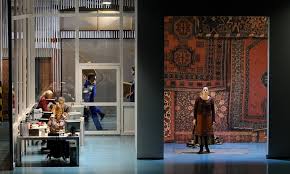London Coliseum, Saturday 26 September 2015
One of the benefits of rare works is that you have little if any preconception as to how they should be staged. Dmitri Tcherniakov certainly takes liberties in his new staging of Shostakovich’s Lady Macbeth of Mtsensk but they are tightly controlled and never clash with the score. As a result the impact is often overwhelming, not least from the battery of brass in the side boxes.
For most of the evening the stage is filled with a bright modern factory, in the midst of which is a carpeted closet within which Katerina spends much of her time. Boredom is a key feature of the opening sections of the opera, but where the factory workers bring a rough, if often violent, humour to their lives, Katerina is self-absorbed and increasingly obsessed by her sexual frustration. This is not helped by the insensitive and often drunken attention of her father-in-law Boris. While his murder may not be morally acceptable it is certainly understandable in the claustrophobic circumstances in which she is forced to live.
As her relationship with Sergei develops, her obsessive traits become increasingly obvious to the point where she snaps and it is downhill from that point onwards. The final act is the furthest removed from any conventional approach. Where the score expects a large open space and a milling chorus of prisoners, we are given a tightly confined cell within which Sergei is able to have sex with Sonyetka while Katerina sleeps. It is brutal and unforgiving, as is her death at the hands of the prison guards. Forcing the chorus off-stage brings an entirely different focus to this final scene and we are ever more aware of the catastrophic effect on her life of Katerina’s inability to take control of her situation.
The work is cast from impressive strength with Patricia Racette an utterly convincing anti-heroine. Her self-control in the public scenes, putting up with abuse and violence, her icy stillness as she poisons her father-in-law, her gradual sexual melt-down are all crafted with a musicality and acting skill that is rare even today on the operatic stage.
John Daszak’s Sergei is a slippery individual, a rough workman who is used to getting his own way and does not care who gets hurt in the meantime. The voice retains its heroic edge and seems to improve with age. Robert Hayward’s fiercely sung Boris makes little effort to ingratiate himself and his death comes almost as a relief. Of the many smaller parts, Adrian Thompson was splendid as the Shabby Peasant, destroying the wedding breakfast even as he destroys Katerina’s plans.
But above all this was Mark Wigglesworth’s evening. This was his first production since taking over as Music Director and set an impressive standard with fine ensemble throughout and a sense of excitement which communicated easily across a long evening. ENO may have had some problems in recent months – let us hope that this marks a turning point.

